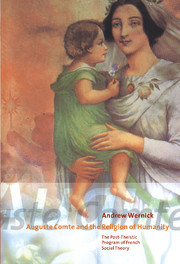Book contents
- Frontmatter
- Dedication
- Contents
- Acknowledgments
- 1 Introduction: rethinking Comte
- 2 The system and its logic (I): from positive philosophy to social science
- 3 The system and its logic (2): from sociology to the subjective synthesis
- 4 Religion and the crisis of industrialism
- 5 Love and the social body
- 6 The path to perfection
- Humanity as ‘le vrai Grand-Être’
- 8 Socio-theology after Comte
- References
- Index
2 - The system and its logic (I): from positive philosophy to social science
Published online by Cambridge University Press: 05 July 2014
- Frontmatter
- Dedication
- Contents
- Acknowledgments
- 1 Introduction: rethinking Comte
- 2 The system and its logic (I): from positive philosophy to social science
- 3 The system and its logic (2): from sociology to the subjective synthesis
- 4 Religion and the crisis of industrialism
- 5 Love and the social body
- 6 The path to perfection
- Humanity as ‘le vrai Grand-Être’
- 8 Socio-theology after Comte
- References
- Index
Summary
The two Comtes
Any attempt to think through the coherence (or non-coherence) of Comte's work as a whole is faced with a difficulty that has attended its reception from the outset. The world religion he aimed to found, and whose Grand-prêtre he proclaimed himself to be, was never more than a marginal sect. The Positivist catechism, calendar, liturgy, sacraments etc. are of interest today only as an example of the kind of ideological exotica that flourished in the radical period that culminated, politically, in the upheavals of 1848. At the same time, Comte's entire oeuvre consisted of tracts designed to establish the intellectual basis of that religion, to train its clergy, or to evangelise on its behalf. To take Comte seriously, then, has always required some strategy for separating what Durkheim and others called ‘the absurdities’ into which Comte's religious mission led him from those aspects of his work (conventionally, his philosophy of science, and the methodological relections under-pinning his premature founding of sociology) deemed to have a more enduring intellectual relevance.
Among the eccentricities which found their way into his texts, and which, outside the coterie of true believers, have particularly held him up to ridicule, were a numerology (which dubbed the first three cardinal numerals sacred, held the number seven, and generally all primes, in high regard, and provided classficatory principles for his profusion of systems and tableaux générales) and an extreme version of the Romantic culte de la Femme. Comte's gynolatry was combined, moreover, with an almost parodic puritanism.
- Type
- Chapter
- Information
- Auguste Comte and the Religion of HumanityThe Post-theistic Program of French Social Theory, pp. 22 - 49Publisher: Cambridge University PressPrint publication year: 2001



